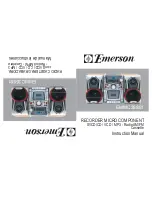
allowing for a maximum treble gain of +12dB or maximum decrease of -30dB. Turning the knob in a
counter-clockwise direction will decrease the amount of treble applied to a channel signal, turning the
knob in a clockwise direction will increase the amount of treble applied to a channel signal.
CHANNEL MIDRANGE CONTROL -
This knob is used to adjust the midrange levels of a chan-
nel allowing for a maximum midrange gain of +12dB or maximum decrease of -30dB. Turning the knob
in a counter-clockwise direction will decrease the amount of midrange applied to a channel signal,
turning the knob in a clockwise direction will increase the amount of midrange applied to a channel
signal.
CHANNEL bASS CONTROL -
This knob is used to adjust the low frequency levels of a channel
allowing for a maximum bass gain of +12dB or maximum signal decrease of -30dB. Turning the knob
in a counter-clockwise direction will decrease the amount of bass applied to a channel signal, turning
the knob in a clockwise direction will increase the amount of bass applied to a channel signal.
5. Master VoLuMe controL -
This fader is used to control the master output level (main volume).
To avoid distorted output try to maintain an average output signal level no greater than +4dB. To avoid
speaker damage that may be caused by excessive volume, be sure this slider is always set to zero
(completely down) before turning the unit on.
6. Master output Mono/stereo Button -
This button switches the Master Output signal
between stereo and mono.
7. Master output BaLance controL -
This knob is used to control the pan, adjust how much
of the signal is sent to the left and right output level. For true stereo imaging, maintain the knob in the
12 o’ clock position.
8. Master VoLuMe LeVeL inDicators -
The dual MASTER LEVEL LED indicators are used to
detail the master fader output level. The meters will detail the output level of both the left and right
channels.
9. poWer sWitch -
This is the main power ON/OFF switch. Before you turn the power on be sure you
have made all connections to the mixer. Also be sure you amplifiers are turned off. Remember mixer on
first and turned off last.
10. sD pLaYer & LcD -
This is the SD Player, Controls, and LCD. The player and LCD will be
explained on pages 12-14.
11. auX 4 input Jack -
This Aux input is for the use of a Mp3 player, or satellite radio. Input volume
will be controlled by the channel four
fader. The channel
sOUrCE sELECtOr switCh (2)
must be
in the "Aux 4" position, to monitor any source connected to this jack.
12. heaDphone Jack -
This jack is used to connect your headphones to the mixer allowing you to
monitor the cue source. Use headphones only rated at 8 ohms to 32 ohms. Most DJ headphones are
rated at 16 ohm, these are highly recommended. Always be sure the
CUE LEVEL VOLUME (13)
is set
to minimum before you put the headphones on.
13. cue LeVeL VoLuMe controL -
This knob is used to adjusts the headphone volume output
level. Turn the knob in a clockwise direction to increase the headphone volume.
14. cue MiXinG controL -
This functions allows you to monitor the Cue level as well as the
Program (main output) level in your headphones. A channels Cue Level may only be monitored if the
channels
CUE (20)
function is selected. To select a channels cue function press the
CUE bUttOn
(20)
that is directly associated with the specific channel you wish to monitor. You may use the mixing
function to blend both the Cue level and the Program level together. You can vary the output level to
©
American Audio
®
- www.americanaudio.us - Q-SD Instruction Manual Page 9
Q-SD
fRONT PANEL - CONTROLS AND fUNCTIONS CONT.










































